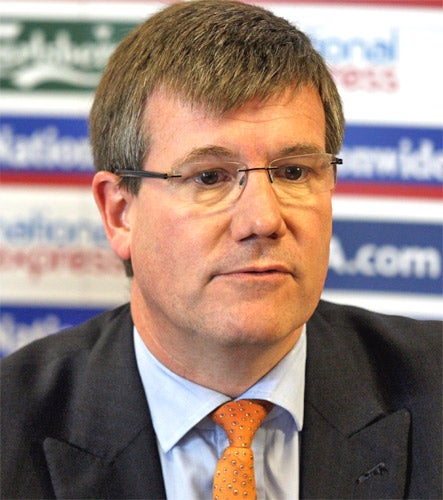Government must step in to overhaul FA, says Watmore
Former chief executive of game's governing body left his post 'frustrated' by board's vested interests

The Government has quite enough on its plate for the moment, but that did not stop a man who should know from suggesting yesterday that football governance reform should be added to David Cameron's in-tray.
Ian Watmore is a senior civil servant with an impressive track record in both private industry and Whitehall. He was also, for 13 frustrating months, chief executive of the Football Association.
He resigned in March last year because, he told the select committee investigating the game's governance, "I got into a place where everything I was trying to move on was going into cul-de-sacs, I was frustrated about a number of things and I didn't really feel I had control, so I decided to do something else."
That proved to be his current role as head of the Government's efficiency and reform group – it says much about how intransigent and ridden by vested interests football is that Watmore regards reforming and cutting the civil service as a more attractive, and presumably more achievable, proposition.
Watmore told the latest sitting of the culture, media and sport select committee into football governance in Westminster yesterday that only through "external" influence – ie Government intervention – would football reform itself.
He drew parallels with the post-Hillsborough Taylor Report when the Government forced a reluctant sport – to its ultimate benefit – into changing the way it treated supporters. Governance reform could, he felt, be as significant. It is needed because the boom ignited by the Taylor Report, and given impetus by Italia '90, led directly to the creation of the Premier League and, subsequently, the diminution of the Football Association's power.
As Steve Coppell told the committee: "If the aim of the Premier League was to create the most exciting league in the world, it has succeeded. If the aim was to create a successful England team, it has not."
That was indeed the FA's aim 20 years ago, but its administrators were quickly outflanked by the new league. As a result, said Watmore, the FA's role in governance was "actually a weak and weakening role". He added: "The Football Association is not in a good place at a strategic level."
Watmore said he believed the FA should take more of a role in preventing club's becoming overly indebted and had pushed for the FA to be able to put financially mismanaged clubs into "special measures" like schools. He had also suggested it "should be explored whether we can restrict debt-laden takeovers" [as in the case of Manchester United].
That, like many other initiatives, was impossible with an FA board each fighting their own corner. Watmore said: "The FA should be independent yet it has people on its board who have a severely conflicted interest. They are very good people, have a very good knowledge, experience and so on but are conflicted. I think the usual analogy I would use is you would not want to run Ofcom with Sky, BT and the BBC."
Independent directors were needed, said Watmore. This is an ongoing theme of many submissions to the enquiry, though few have gone as far as Watmore and argued that half the board should be independent.
Watmore was the FA's fifth chief executive in 12 years (not including the various caretaker stints of David Davies). Prior to taking over, Watmore said he met his three immediate predecessors, Adam Crozier, Mark Palios and Brian Barwick, and each said there were too many vested interests, and a lack of independence, in the board.
Watmore's criticism of the FA was backed by Richard Bevan, the dynamic chief executive of the League Managers' Association, who said: "The operating framework of the FA doesn't encourage creativity, proactivity or leadership."
Player power was also discussed yesterday with Martin O'Neill reflecting that they "are now in charge, which is a bit of a shame really".
The former Celtic and Aston Villa manager added: "You would hope that if you sign a player, for instance, on a four-year deal that you would have some control [over their future]. But the control has left the football clubs and gone to the players, and therefore the agents. That is one of the major changes I have seen to the game. When I started out, the player had no control whatsoever, it has gone full circle."
Join our commenting forum
Join thought-provoking conversations, follow other Independent readers and see their replies
Comments
Bookmark popover
Removed from bookmarks